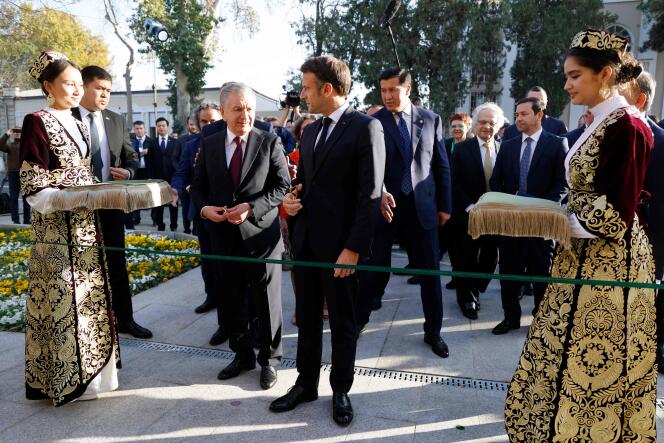


It was certainly a symbolic moment. On Thursday, November 2, just as French President Emmanuel Macron was visiting Uzbekistan, the Orano mining group announced that it had extracted its first 350 kilograms of uranium in the country. The announcement confirmed the extent to which Macron's tour of Central Asia, which took him to Kazakhstan on November 1 and Uzbekistan the following day, was designed to strengthen France's economic presence in the former Russian heartland, now being courted by Turkey, the European Union and China.
Orano, EDF, TotalEnergies and Eiffage used Macron's visit to sign contracts at a business forum in Samarkand (eastern Uzbekistan), the legendary former stopover on the Silk Road in the days of Marco Polo. The event was endorsed by Macron and Ukranian President Shavkat Mirziyoyev, with the good relationship evident in the smiles and pats on the back.
"Uzbekistan is transforming, and we must be there," insisted Macron at the opening of the forum. France supports Uzbekistan's policy of "regional peace and stability," "openness and modernization," Macron stressed, bringing with him no fewer than 20 French business leaders on his tour of Central Asia, as well as deputy ministers Roland Lescure (industry) and Olivier Becht (foreign trade).
In a bid to emerge from the economic isolation it has suffered for the past two decades, Uzbekistan is looking to open up to foreign investment. Already present in Kazakhstan, where it operates the world's largest uranium mine, Orano has been prospecting on the Uzbek side. The contract signed in Samarkand officially launches the extraction phase for the Djengeldi uranium mine in the north of the country. According to Macron's office, this is a "pilot project" designed to meet environmental standards. France is seeking above all to secure its uranium supplies, both in Kazakhstan and Uzbekistan, especially since Niger is no longer a reliable source.
The visit was also marked by the signing of contracts in the renewable energies sector. French electricity giant EDF signed an agreement for two hydroelectric projects. TotalEnergies signed a memorandum of understanding for the extension of the Tutly photovoltaic power plant, designed to provide better access to electricity for hundreds of thousands of Uzbek households.
A hybrid power plant project – solar, wind, and battery storage – was also signed between Voltalia (a renewable energy player founded by the Mulliez family) and the Uzbek Ministry of Energy. French Treasury funds will also be used for the construction of a drinking water supply system in the Kashkadarya region (south) by the Eiffage group. In addition, the French Veolia and Suez groups, which manage district heating and water purification respectively, will continue to develop their operations.
You have 60% of this article left to read. The rest is for subscribers only.
